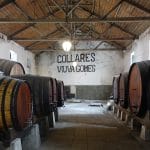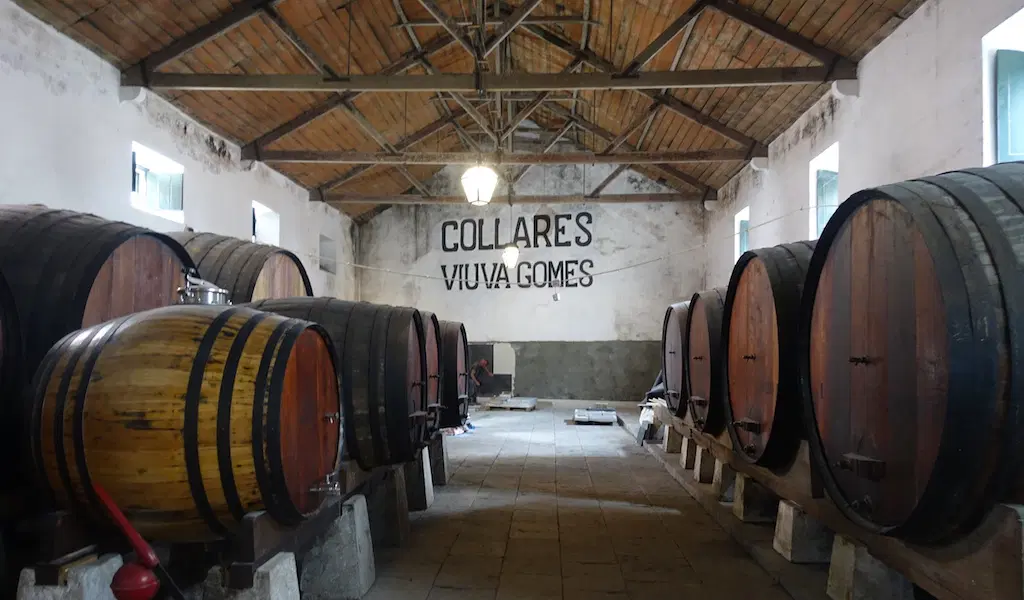Celebrating its 300th birthday this year, the Quinta do Vallado estate, located near Peso da Régua in the heart of the Douro valley, is integral to the history of the region. The current owners are the sixth-generation descendants of D. Antónia Adelaide Ferreira, a legendary visionary and businesswoman who, in the 19th century, changed Douro wines. Francisco Ferreira, the 44-year-old scion of the family, is now leading the winemaking of this old estate, which for years was dedicated exclusively to port and is now producing some great red and white wines.
Still in the middle of the busy harvest period, Ferreira told us that at first he wasn’t very interested in the wine business of the family. “My father was one of the managers of Porto Ferreira, and he was managing the quinta. When he died, my uncle stayed behind the business, and then when I [finished my degree in] agricultural engineering he invited me to work here, in 1997. I always wanted to work in farming but not wine specifically. I guess it was faith that brought me here. As time went by, I started to get involved with the wines, and now I’m totally dedicated.”
 Ferreira feels the inheritance and the responsibility of the Ferreira name. “I’m proud to be part of D. Antónia’s family. She was a fantastic person, and times were really hard in the Douro when she lived here.” He is confident that she would be proud of the work the family is doing. With two of his own three offspring already interested in wine, the legacy is not in danger.
Ferreira feels the inheritance and the responsibility of the Ferreira name. “I’m proud to be part of D. Antónia’s family. She was a fantastic person, and times were really hard in the Douro when she lived here.” He is confident that she would be proud of the work the family is doing. With two of his own three offspring already interested in wine, the legacy is not in danger.
Currently, Ferreira manages Quinta do Vallado with his cousin, João Álvares Ribeiro. Another cousin, Francisco Olazabal, is the consultant winemaker. They are all direct descendants of D. Antónia and they are all part of the Douro Boys, a group of five wine estates who joined forces to promote the wine production of the area with the goal of having standing equal to port. “One of the facts of my generation, which started a bit of a revolution in the Douro wines, is that we live here and are 100 percent committed to these projects,” Ferreira said. “These businesses used to be run from a distance, mostly from Porto.”
In a short time, Quinta do Vallado became known for its red wines, with some excellent whites being produced as well. And of course the fortified wines are where it all started. In the 18th century, port became world famous, and the name Douro too as a consequence.
In the Douro, there’s the saying, “Nine months of winter, three months of hell”
The quinta was bought by D. Antónia almost 200 years ago for producing port, and since then it has never left the family. When the estate’s brand, Porto Ferreira, was sold to Sogrape in 1987, Quinta do Vallado started to produce under its own name and stopped focusing on port, developing new techniques and businesses. The family started its tourism operations in 2005.
New challenges were embraced in 2015. The family opened a wine hotel in another location, Quinta do Orgal. “It’s an excellent way to transmit our wines and the food, as well as our wine traditions,” explained Ferreira. More than 30 acres of organic vineyards have been planted in the second estate, in the Alto Douro, the region that was added to the UNESCO World Heritage List in 2001.

Quinta do Vallado’s 70 hectares of vineyards are planted terraces with local grapes like the red varieties touriga nacional, touriga franca, tinta roriz and tinta amarela and whites viosinho, rabigato, moscatel, verdelho and arinto.
The long history of winemaking and widely appreciated production here is owed in part to the microclimate, which is largely a blessing. In the Douro, there’s the saying, “Nine months of winter, three months of hell”: September is still very hot and the harvest is not easy for those working in the vineyards.
Francisco Ferreira is enthusiastic about the wines being produced at Quinta do Vallado, which have been recognized internationally: “Success comes from the knowledge we’ve collected. To make wines of excellence in the Douro, we have to know the vines really well.”
Besides being endowed with a stunning landscape, the Douro “produces some unique wines with local grapes – but at the same time [it can be] quite different according to altitude. Each plot of land is different. The Douro doesn’t have only one terroir.”
Ferreira asserts that the region is lucky to produce not only port but also other wines. “We’re still young in that area, but we’re doing some very consistent [bottles].”
Hard work and vision seem to run in the family.
 September 14, 2018 CB on the Road
September 14, 2018 CB on the Road
They withstood the phylloxera and the strong Atlantic winds, and are slowly fighting […] Posted in Lisbon September 20, 2021 Night Pickers
September 20, 2021 Night Pickers
Although it’s the oldest wine region in Portugal, Dão in central Portugal does not have […] Posted in Lisbon October 13, 2016 Wine Harvest Week
October 13, 2016 Wine Harvest Week
Wine and health: that was the prevailing philosophy of Joan Cusiné Hill, who in 1978 […] Posted in Barcelona
Published on October 10, 2016
Related stories
September 14, 2018
LisbonThey withstood the phylloxera and the strong Atlantic winds, and are slowly fighting back against urban expansion, so it’s no surprise that a glass of wine made from grapes grown in Colares tastes like no other. The smallest wine region in Portugal, Colares is also probably one of its most distinct. Located on the coastline…
September 20, 2021
LisbonAlthough it’s the oldest wine region in Portugal, Dão in central Portugal does not have the high profile of its neighbor to the north, the Douro Valley. And yet, Dão is the birthplace of the touriga nacional, one of the finest grapes in Portugal, a country with more than 300 different grape varieties. Considering this…
October 13, 2016
BarcelonaWine and health: that was the prevailing philosophy of Joan Cusiné Hill, who in 1978 took over Parés Baltà wines, produced in Penedés, the land of cava. Cusiné Hill, who had already started working in viticulture at the age of seven, applied this philosophy first to himself – to what he ate and drank, to…



















































































